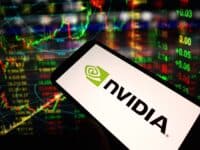

Nvidia Corp. (NASDAQ: NVDA) stock has been hot throughout 2020, but can it continue its winning streak? Analysts remain bullish on the Santa Clara, California-based chip maker, which has stolen business from industry granddaddy Intel Corp. (NASDAQ: INTC).
Once primarily known for its videogame chips, Nvidia is now a major provider of chips for big data centers.
Some big trends stand to benefit Nvidia and its rivals, Intel and Advanced Micro Devices Inc. (NASDAQ: AMD). These include artificial intelligence, gaming and driverless vehicles.
As Wall Street returned from the long weekend, Nvidia was reiterated as Overweight and its stock price target was raised to $363 from $280 at Morgan Stanley. The stock was at $361.05 at market close on Friday, and its consensus target price was down closer to $300.
The AI Boom
AI isn’t a thing of the future; it’s already here. Amazon uses AI to drive recommendations. Many popular Google applications rely on the power of AI. Opening your phone with a face ID is an example that’s easy to understand.
Companies are rapidly innovating with cloud-enabled AI to perform complex tasks and increase efficiency. Starting at $20.67 billion in 2018, the global AI market will grow to $202.57 billion by 2026, according to a forecast from Fortune Business Insights, a data analysis firm based in India.
That growth will come from multiple sectors, including manufacturing. “The rising demand for customized robots is a vital driver of the AI market growth,” Fortune Business found. The analysts said Asian powerhouses China, Japan and South Korea have deployed tens of thousands of sophisticated manufacturing robots in the past few years.
Natural language processing, voice recognition and machine learning are other big areas for AI innovation. Many companies are using this technology to improve customer service with more automated telephone assistants and online “help” bots.
Gaming: Let’s Play
Chip makers also benefit from the phenomenal growth of gaming, which was exacerbated by the coronavirus pandemic. Stay-at-home gamers were looking for ways to occupy more of their time.
Popular, multiplayer games such as Fortnite Battle Royale and Call of Duty: Warzone require powerful processors. And the competition to sell graphics chips is stiff.
“I think that at-home entertainment will unquestionably be much, much larger in the future and be a larger percentage of the global entertainment and leisure budget,” Nvidia CEO Jensen Huang said in a new interview with Venture Beat.
Will Self-Driving Cars Materialize?
The autonomous vehicle is another futurist trend that could boost chip makers such as Nvidia. Self-driving or robotic cars require a great deal of computer processing power to sense the surrounding environment and avoid collisions. But a driverless future hasn’t emerged as quickly as some predicted.
Nearly three in four Americans say the technology is “not ready for primetime,” according to a poll conducted by Partners for Automated Vehicle Education. Self-driving cars have drawn hundreds of millions of dollars in investment. Some of this is from manufacturers like Tesla (NASDAQ: TSLA) and General Motors (NYSE: GM). Other investments have come from tech companies like Alphabet’s Waymo.
For now, most manufacturers are focusing on shared control between driver and machine. With today’s partially automated driving systems, every vehicle that includes self-driving features, like lane-keeping or adaptive cruise control, allows the driver to retake control at any time for any reason.
The Insurance Institute for Highway Safety (IIHS) recently released a set of safety recommendations for designers of partially automated driving systems. All such systems, IIHS, points out, “still need the driver to be involved at all times.” That implies that partially automated driving systems must have “robust methods of monitoring driver engagement and more effective ways of regaining the driver’s attention when it wanders.”
In the meantime, even today’s new cars designed for human drivers require some serious chips. Just last week, Nvidia rolled out a new chip architecture called Ampere that can be used by automakers for both driver and driverless vehicles. For manufacturers of human-driven vehicles, the Nvidia chip powers advanced driver-assistance programs.
Nvidia’s Huang still believes in the longer term outlook for driverless cars. “The automotive industry, they’re hunkered down right now but they will absolutely invest in the future of autonomous vehicles,” he said in a call to discuss the recent quarter results. “They have to. Or they’ll be extinct.”
Huang sees another COVID-related opportunity. “You’re going to see a whole bunch of design for grocery deliveries because of the surge of demand,” he told Venture Beat. “The idea of being able to do some of that in the cities and in urban areas, with a robot, it’s pretty enticing.”
Overall, Huang argues that Nvidia’s future is bright. “It is really rare to have a company that is … doing scientific computing, and working with … AI and cloud computing and robotics, and also to be benefiting from staying at home because video games are popular, people need to buy cars to do their work, and they need workstations at home to work,” he said. “So we are diversified and we are working on futuristic things and those futuristic things have been accelerated because of the pandemic.”
Sponsored: Attention Savvy Investors: Speak to 3 Financial Experts – FREE
Ever wanted an extra set of eyes on an investment you’re considering? Now you can speak with up to 3 financial experts in your area for FREE. By simply
clicking here you can begin to match with financial professionals who can help guide you through the financial decisions you’re making. And the best part? The first conversation with them is free.
Click here to match with up to 3 financial pros who would be excited to help you make financial decisions.
Thank you for reading! Have some feedback for us?
Contact the 24/7 Wall St. editorial team.



